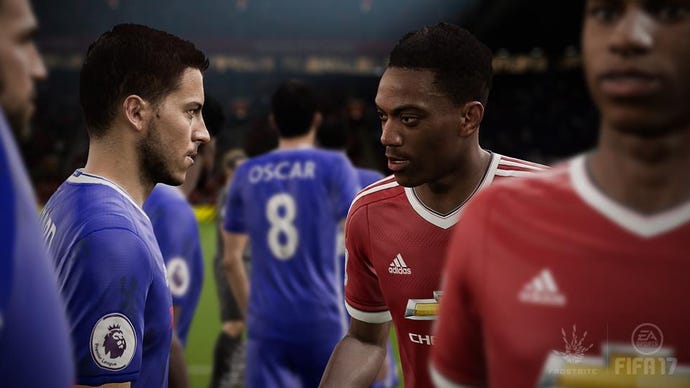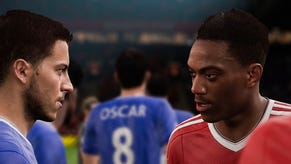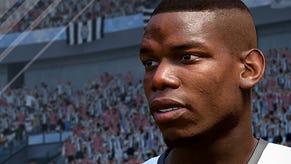FIFA 17 promises the biggest shake up in years
A new story mode and new engine deliver real changes to EA's annual release.
FIFA 17 promises the biggest shake up in years
The pre-release hype and promises revolving around groundbreaking new additions to FIFA are as predictable as a Daniel Sturridge injury or lack of title challenge from Arsenal. It's difficult not to feel jaded and suspicious when the same old patterns repeat themselves. There's only so many times you can sit there in genuine belief as someone tells you that upcoming changes are going to revolutionise an annual release.
"FIFA has tended to opt for an overblown, almost comic version of football in which tricks, skills and outlandish shots take priority. Thoughtful passes and an ability to predict what is going to happen in one or more moves time now feels more important."
Without wanting to indulge the marketing gimmicks too much, FIFA 17 does hold more potential than past releases when it comes to offering something that could realistically be considered significantly altered.
For starters, the whole thing is being built upon the EA DICE developed Frostbite engine - the same framework upon which the likes of Mass Effect: Andromeda, Battlefield 1 and Mirror's Edge Catalyst are created. Moving away from an engine dedicated solely to the building of football allows for a more diverse range of visual highlights to be created, opening the door to something that looks more like the real thing.
Interactions between players, for instance, are visibly more lifelike as individuals jostle and use their physical weight against one another. That canned look to animations that has plagued past FIFA releases is, therefore, less noticeable and many times less repetitive. Lighting, too, particularly evident when floodlights pierce heavy rain, is more dramatic, severe and provides a greater differentiation between what it's like to play under skies that are either clear or dark.
Frostbite's major facilitation, however, is the inclusion of a major new game mode: The Journey. Telling the story of young Alex Hunter, The Journey is a mode focused on exploring a narrative based around what it's like to be a young player searching for their place in professional football. Essentially it's an RPG-lite in which you make decisions that affect the direction of Hunter's life and his personality off the pitch.
How you react to your manager, the press and teammates that double up as rivals for a place up front in the starting 11 inform how his footballing life progresses. Upon learning that you're going to be sitting on the bench in the next match, for instance, you can react by trying to mentally unsettle the player chosen ahead of you or you can offer them congratulations and support for the good of the squad's cohesion. Frostbite allows for the implementation of scenes that occur off the pitch, such as meetings in the manager's office, dressing room conversations, post-match interviews and glimpses into Hunter's personal life at home.
Frankly, the writing at this point comes across as crass and clichéd. Certainly, this a story closer to B-movie fodder than Cannes nominee. From the glimpse we've seen, characters feel shallow and their motivations and interpretations of events are, at best, childish. Then again, maybe this is designed as a satire on the kinds of cosy, privileged lives young Premier League footballers enjoy. Given that the names of Harry Kane and Marcus Rashford are touted as story consultants, however, the satire angle is probably a stretch.
Your evolution on the pitch is determined by the quality and nature of your performance. As in the existing Be A Pro mode you control only your player, with your impact on the game rated across a number of areas. If the game senses that you're looking to pass more than shoot then your passing trait is going to advance more quickly and see you becoming a creator over a finisher. The combination of various traits inform what kind of footballer you become.
The Journey is the eye-catching inclusion, then, but it's not the only difference separating this coming season from the last. New attacking options are headlined by an ability to perform a low, driven shot towards goal of the sort that characterises the finishes of Robert Lewandowski and, from further out, Xabi Alonso.
These are performed by hitting shoot as normal, followed by tapping the button again before the shot is taken. Helpfully, the system also applies to headers, allowing you to hit the ball down into the ground after successfully latching onto a corner or free kick. Other attacking options come in the form of quicker, longer throws from the keeper and the option of wrestling a defender for position so that you can bring a pass out of the air with foot or chest rather than opt always for a header.
Making use of these attacking techniques is helped by the promise of AI teammates that make more intelligent and varied runs towards goal and between defenders. Runners might look to curve their runs towards goal, or make one purely with the intent of drawing a defender out of position to allow someone else to take advantage of the space. Through balls and passes can also be curved so that you've a better chance of getting the ball into the feet of players looking to make these new kinds of runs into space.
"Moving away from an engine dedicated solely to the building of football allows for a more diverse range of visual highlights to be created, opening the door to something that looks more like the real thing."
Indeed, playing the game with a keen eye on interpreting what kind of impact these changes have on the moment-to-moment of a match reveals a game that feels as though it has the potential to move beyond what has been offered up until now. Our demo featured an unfinished edition of FIFA 17, so it's impossible to judge accurately how the final product is going to turn out - but the promise is there.
Certainly, there seems to be scope for more variations of approach. For all EA Sports likes to claim that it provides a realistic simulation of football, FIFA has tended to opt for an overblown, almost comic version of football in which tricks, skills and outlandish shots take priority over all else. Thoughtful passes and an ability to predict what is going to happen in one or more moves time now feels more important.
Still, no matter what, it's The Journey that much coverage and critique of FIFA 17 is invariably going to revolve around. Do FIFA players want a mode focused on storytelling over playing football? Whether the answer is 'yes' or 'no', at least EA Sports is prepared to risk asking the question. At the very least it will succeed in muting much of the annual criticism concerning the fact that so few meaningful changes occur year to year.












